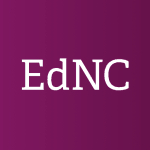Science of Reading: In NC, a Race to Get More Students Reading on Grade Level
Data show gains in literacy since the heart of the pandemic, though students remain behind where they were before the pandemic

Get stories like this delivered straight to your inbox. Sign up for The 74 Newsletter
Rep. John Torbett, R-Gaston, told staff from the state Department of Public Instruction (DPI) that he wants to know when efforts to get elementary students on reading level will be successful.
“Tell me that, and I’ll be satisfied,” he said.
Deputy State Superintendent Michael Maher said that was a hard question to answer on the spot.
“That’s a great question,” he said. “I think that’s one we’ll have to get back to you on.”
The question came during a meeting of the Joint Legislative Education Oversight Committee that heard presentations on reading, along with a number of other topics, on Nov. 29.
The presentation from DPI was on the Excellent Public Schools Act, a law that was updated in 2021 to emphasize the use of the science of reading to ensure students in elementary schools can read on grade level by grade three.
The “science of reading” refers to a body of research conducted by reading experts, especially cognitive scientists, on how we learn to read and how we read to learn. According to DPI, it is “evidence-based reading instruction practices that address the acquisition of language, phonological and phonemic awareness, phonics and spelling, fluency, vocabulary, oral language, and comprehension that can be differentiated to meet the needs of individual students.”
The data was previously presented and discussed at the State Board of Education in October and shows gains in literacy since the heart of the pandemic, though students remain behind where they were before the pandemic.


Torbett went on to say that efforts to teach students to read in North Carolina are not new.
“We’ve been talking this for a long long time … I want some assurity … about when do you see a proficient reading at the end of third grade for our kids in North Carolina?” he asked. “If not, then it’s just talk.”
Maher explained that efforts to train teachers in the science of reading are still in early phases. The 2022-23 school year is the first year implementation in classrooms began, according to DPI. Maher said it is likely that results from these efforts will be known when students now in kindergarten reach third grade.
The presentation was just one legislators heard in this meeting, which is coming ahead of the start of the long session in January. Next year’s session will also include the creation of the next two-year budget for the state.
See the full presentation here.
Schools That Lead
Julie Marks, the director of program evaluation and a senior research associate with the Education Policy Initiative at Carolina (EPIC), presented an evaluation on Schools That Lead Networked Improvement Communities.
The program came from a 2018 directive from lawmakers that required DPI to contract with Schools That Lead to provide professional development to teachers and administrators in up to 60 schools.
The program’s professional development model focuses, in part, on reducing “early-warning indicators” in elementary schools, reducing the number of ninth graders who are held back, and increasing on-time graduation. The program aims to do this by teaching educators how to design and implement improvement strategies in their schools.

The work in schools was done on a three-year timeline with the aim of ultimately improving student performance.

In all, the program reached 52 schools in 15 districts and charter schools, impacting 30,000 students, most of whom were experiencing poverty.
A case study was given to illustrate how the process works. For instance, a teacher looked at the problem, which was students failing a course. She looked at the data and saw that students had zeros on many assignments, and then she gave students a tool to track the completion of their work. All students subsequently improved their grade, with most bringing their grade up to passing.

The evaluation found an increase in knowledge among educators about “improvement science,” the process the program teaches to help improve situations in schools. It also found that the program gave educators the tools to try to address “barriers to student success.”

The evaluation found that students in schools participating in the program showed marked improvement in both graduation rates and chronic absenteeism.

A separate presentation on Schools That Lead showed the effectiveness of the organization’s approach when it comes to putting students on watch lists if they show early warning indicators.

Marks said that “Schools That Lead is something unique and different,” and ended her presentation with the following quote.

See the presentation on the evaluation here.
N.C. Promise
Lawmakers also heard about the N.C. Promise program, which provides dramatically reduced tuition for students at specific universities in the University of North Carolina System.
The program began in 2018 with Elizabeth City State University, the University of North Carolina at Pembroke, and Western Carolina University. Fayetteville State University will start in the program this fall.
N.C. Promise sets tuition for resident students at $500 a year and tuition for out-of-state students at $2,500.
The following graphic shows changes in enrollment for the colleges over time, taking into account that the COVID-19 pandemic impacted interest for reasons that couldn’t be controlled.

A specific presentation on Fayetteville State University shows how its inclusion in the program is already showing results for this fall’s attendance.

See the N.C. Promise presentation here.
Community college organizational assessment and climate survey
Finally, lawmakers heard about an organizational assessment and a climate survey of the community college system, something already covered previously by EdNC.
Part of the findings of the organizational assessment included challenges facing the community college system.

Burr Sullivan, chair of the State Board of Community Colleges, noted the issues raised by these studies.
“We have some more work to do, but we are on the right track,” he said.
He also noted that he presented the findings to Bill Carver, interim president of the community college system, when he stepped into the role in July for the second time in his lifetime.
While the system continues to search for a permanent new president, Sullivan said the work on making changes based on the findings has to start now.
“The issues that have come out of these surveys can’t wait for the next permanent president,” he said.
See that presentation here.
This article first appeared on EducationNC and is republished here under a Creative Commons license.
Get stories like these delivered straight to your inbox. Sign up for The 74 Newsletter

;)